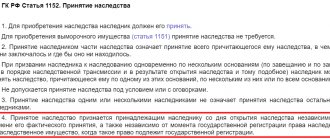Details of the law on privatization: Article 1 of the current legislation establishes the procedure for transferring ownership of residential premises to citizens - only on a free basis. All minors and adults registered at the time of privatization in the apartment must participate in privatization. Tenants of premises (registered citizens) have the right to privatize according to social security rental (agreement) from municipalities and other state housing owners The state allows participation in the privatization of residential premises only once for the entire time - that is, you can receive free housing ownership from the state only 1 time Re-privatization is allowed, that is, a privatized apartment can be transferred back to the state fund , and remain a simple tenant with reduced ownership rights.
What does registering ownership of an apartment provide?
Many homeowners ask questions: why privatize their apartments, and is this procedure mandatory?
The answer is simple - from the moment of state registration, ownership of the property is generated, which gives the owner the opportunity to dispose of it at his own discretion and make any transactions with it.
Based on this, the advantages of privatization are as follows:
- the state gives a citizen the opportunity to become the owner of real estate, the cost of which in some cities reaches several million rubles;
- the owner has much more rights: the apartment can be sold, donated, exchanged, mortgaged, divided into shares, sold or donated one of the shares;
- privatized real estate can be bequeathed or inherited;
- You can rent out your own housing and receive a monthly income (it is prohibited to rent out municipal housing without special permission);
- on your own square meters you can make redevelopment permitted by law, improving your living conditions;
- the owner cannot be evicted from the home without compensation for expenses (providing similar living space or covering the market value), for example, if the house is subject to demolition;
- even for significant rent debts, it is almost impossible to evict the owner from the apartment, especially if this is his only home;
- the owner of the living space has the right to register, write out and evict persons living on it at his own discretion.
Shared ownership
As noted above, an apartment can be privatized not only for one tenant, but also for several. In this case, common ownership of the property is considered shared ownership. To privatize real estate for several family members you will need:
- Obtain the consent of each owner to carry out this procedure.
- Unanimous decision on privatization.
- If one or more residents refuse to participate in the transaction, they must prepare a written refusal in favor of the other owners, which will be notarized. Consent cannot be obtained by force through judicial proceedings.
- When minors or disabled children live in the object of the transaction, consent will be required from the guardianship and trusteeship authorities.
If housing is privatized by a husband and wife, its area is distributed in shares, since this apartment was not jointly acquired and will not be joint property.
A separate share of an apartment cannot be privatized.
Citizens who have the right to register housing ownership
Persons registered and living in it have the right to transfer municipal housing into personal ownership.
Firstly, these are adults and children who have permanent registration at this address and agree to privatization:
- Responsible employer and family members living with him.
- Disabled relatives who are supported by a responsible tenant.
- Incapacitated relatives (guardians act on their behalf).
- In rare cases, people who are not related to the employer (friends, acquaintances) may take part in privatization. To do this, they need to be registered in the apartment in advance, having secured the written consent of all citizens living and registered in the living space.
Secondly, minor children who are not registered at the place of residence with parents living at this address.
Thirdly, temporarily absent citizens who have permanent registration and live in a privatized apartment:
- Those on long business trips or working on a rotational basis.
- Those undergoing treatment in medical institutions located over long distances.
- Those serving sentences in places of detention.
For all these citizens, including minors, square meters are privatized in equal shares.
Methods of registering rights
There are 2 ways to transfer state real estate into ownership: self-registration of ownership or turning to the services of specialists.
1 way
Independent preparation of documents and implementation of actions to transfer living space from state to personal property.
Peculiarities:
- no additional cash expenses are required - no need to pay for services and consultations of specially hired people;
- you need to be prepared for enormous losses of your personal time - visiting various authorities and tedious standing in queues for numerous extracts and certificates.
The rapidly developing electronic services market, which makes it possible to collect and approve certificates via the Internet, can provide significant assistance in this regard.
Method 2
Contact specialists (lawyers, realtors) who have the knowledge and experience that will save you from queues and paperwork.
Peculiarities:
- The law firm takes care of all paperwork;
- your personal presence is usually required only for the final signing of all documents, which saves time;
- there is confidence that certificates and extracts will be collected in full and correctly executed;
- Not everyone can afford the services of lawyers.
This option is suitable for people who do not have time to prepare the necessary papers, but have the opportunity to pay the required amount for the help of specialists.
A package of necessary documents for privatization of an apartment
A detailed list of all papers required to register ownership of living space is determined by the regional government authority vested with such powers.
The standard list consists of the following package:
- Application for privatization in the established form.
- over 14 years of age registered in the residential premises to participate in the transfer of housing into private ownership. The refusal must be notarized.
- Russian Federation passports of each member of the procedure, for minors under 14 years of age - birth certificates, for spouses - marriage certificate.
- If one of the persons specified in the social tenancy agreement has died - a death certificate (originals and photocopies of all documents).
- Technical and cadastral passports, with a description of the floor plan, apartment diagram, indicating the main parameters: floor, total and living area, layout, etc. (originals and copies certified by BTI). If redevelopment has been carried out on the living space, it must be legalized, otherwise you will have to pay a fine.
- The order along with the social tenancy agreement (originals and photocopies). If necessary, they can be ordered from the UIRC (Unified Information and Settlement Center).
- An extract from a personal account indicating the presence or absence of debt on housing and utility bills (valid for no more than 30 days ). If there are debts, they will have to be paid off.
- Certificate from the passport office about all registered and discharged persons from the moment of receipt of the housing warrant (valid for 14 days ).
- Certificates of registration from previous places of residence, if registration was after July 4, 1991.
- A certificate for each participant indicating that the right to privatization has not been used before.
- Permission from the guardianship and trusteeship authorities, if minor children are registered in the privatized squares. If you discharge your child less than 6 months before the start of registration of the home in personal possession, you will receive a refusal.
- An extract from the Unified State Register of Rights to Real Estate and Transactions with It, indicating that housing has not been privatized before (valid for no more than 30 days ).
- Receipt for payment of the state duty for registration of property rights in the Unified State Register.
A sample application for privatization of an apartment can be downloaded here.
Trustees and guardians submit certificates confirming their authority.
Persons preparing a documentary package on behalf and on behalf of other citizens present a notarized power of attorney (original and a copy certified by a notary), their passport and the principal (originals, copies).
After the expiration of the specified documents, you will have to draw them up again, otherwise the process of transferring real estate into personal property will be refused.
Drawing up a privatization agreement
The agreement must contain data that will be entered into the Unified State Register of Real Estate:
- privatization participants and persons who refused the procedure;
- date of privatization;
- signature of a representative of the institution responsible for the housing stock and future homeowners;
- address of the residential property being privatized, its area, number of rooms;
- number of floors and other information about the property that identifies the housing.
Owners over 18 years of age sign the agreement independently or through an authorized representative. If the owner is a child aged 14-18 years, then he puts his signature on the agreement with the permission of his parents and guardians. If the child is under 14 years old, then the parents/guardians sign the contract for him.
The agreement signed by all applicants will subsequently need to be sent to Rosreestr
.
Where to apply?
You must contact the municipality that owns the property with the package of documents listed above. Usually this is the Department of Housing Policy or Housing Department , you can also submit an application to the MFC (Multifunctional Center) at your place of residence.
After reviewing the submitted papers, a decision is made. If it is positive, an agreement is concluded on the gratuitous transfer of state property into personal ownership, subject to mandatory state registration.
In what cases can they refuse?
Employees of the State Registration Chamber may refuse to register real estate after privatization for several reasons:
- The registrar found errors in the documents. You just need to get new ones, without errors, and then re-write the application;
- deliberate falsification of documents was discovered;
- the basis for registration of ownership has not been confirmed, for example, the apartment has not been privatized;
- the citizen did not have the right to privatize this apartment;
- an encumbrance or the right of a third party to register ownership of this property was discovered;
- Not a complete package of documents was provided.
If a citizen considers the registrar’s refusal to be unlawful, he can go to court to resolve the controversial issue that has arisen. However, most often, the reason for the refusal is due to incorrect documentation, and after receiving new certificates and contracts, or a technical plan for the apartment, the citizen still receives a certificate.
Registration of ownership of a privatized apartment is a long and tedious procedure, but it is impossible to do without it. You can only make the task easier by preparing all the papers in a timely manner and following the instructions.
Is it possible to challenge a deed of gift for an apartment? Find the answer in the article: is it possible to challenge a deed of gift for an apartment? The procedure for legitimizing redevelopment that has already been done is described on this page.
The features of obtaining a cadastral passport for an apartment in a new building are discussed here.
Timing and approximate cost of the registration procedure
The average duration of consideration, registration and delivery of final documents takes 3-5 months , if privatization is urgent - up to 2 months . But you will have to pay extra for acceleration.
It is clear that this procedure is relatively free. The cost of processing all papers ranges from 5 to 20 thousand rubles .
This includes:
- state duty for registering property rights (from January 1, 2015, it is 2,000 rubles and is divided among all participants in the privatization process);
- registration of papers with a notary;
- the cost of certificates, extracts, preparation of necessary documents in the BTI, passport office, Unified State Register.
If you hire a lawyer or realtor to collect and submit documents, then you need to add another 10-30 thousand rubles .
How much time and money will be spent?
You can wait different times for the result after submitting an application for registration of rights. This mainly depends on where the application was made. Registration occurs faster through the MFC and the Registration Chamber (no more than 14 days).
If you used the State Services portal, you will have to wait 16-17 days. But there are times when you need to wait less, depending on how long the line is and how busy the employees are.
The state duty paid for these services is 2,019 rubles. Only the payment shown is required. No other taxes are provided.
However, some additional costs may apply. For example, if the applicant wished to use the services of the MFC or hired a representative by providing him with a power of attorney.
Upon completion of registration, the applicant receives a certificate of registration of rights containing the basic requirements about housing and the owner. It is this certificate that will be necessary when conducting various housing transactions.
Obtaining a certificate of state registration of ownership of an apartment
In order to fully manage your living space, you need to obtain a certificate of ownership.
For this you will need:
- cadastral passport;
- BTI registration certificate;
- order for living space or social tenancy agreement (original and copy);
- privatization agreement with certified copies;
- receipt of payment of state duty;
- statement.
These documents must be submitted to the Office of the Federal Registration Service or its territorial division.
The certificate will be ready in 1 month , in the accelerated version - in 10 days .
In order to avoid claims and lawsuits in the future, when transferring housing into private ownership, it is necessary to strictly follow all the nuances and procedures defined by law. The efforts spent are more than repaid by the rights and freedom to manipulate your own real estate.
Design features
After submitting documents to the relevant organization, the applicant must obtain a receipt from its employee confirming their acceptance. If an employee fails to provide such a document, you need to remind him of this.
This way you will protect yourself from problems by proving the employee’s responsibility for the accepted papers and will have the opportunity to prove the date of receipt of the application. The receipt cannot be lost. It will need to be exchanged for a completed certificate of entitlement.
It is issued upon completion of registration and receipt of a contract from the housing department of the administration.
Denationalization can also be carried out in court if any controversial issues arise. In such a situation, the certificate will be issued not by agreement, but by court decision.







